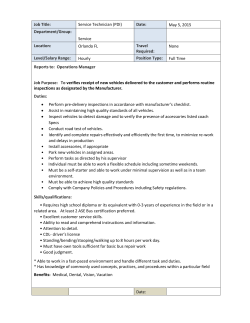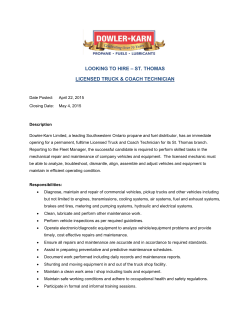
Kenneth Leonard, Director, Intelligent Transportation System Joint
Redefining Mobility: Contra Costa Transportation Authority’s Connected Vehicle/ Autonomous Vehicle Summit Panel #1: National Vision for a Connected Future March 31, 2015 Kenneth Leonard Director, Intelligent Transportation System Joint Program Office (ITS JPO) U.S. Department of Transportation (USDOT) Outline USDOT ITS JPO Strategic Planning Process ITS Strategic Plan Components and Hierarchy Vision and Mission Strategic Themes Program Categories 2015-2019 □ Connected Vehicles □ Automated Vehicles Summary U.S. Department of Transportation ITS Joint Program Office 2 USDOT Modal Collaboration and Partnership U.S. Department of Transportation ITS Joint Program Office 3 Vision and Mission VISION Transform the Way Society Moves MISSION Conduct research, development, and education activities to facilitate the adoption of information and communication technology to enable society to move more safely and efficiently. U.S. Department of Transportation ITS Joint Program Office 4 ITS Strategic Plan 2015-2019 Kate Hartman U.S. Department of Transportation ITS Joint Program Office The Strategic Planning Process: Reflecting Stakeholder Input U.S. Department of Transportation ITS Joint Program Office 6 ITS Strategic Plan Components and Hierarchy U.S. Department of Transportation ITS Joint Program Office 7 Program Categories Connected Vehicles program category will be primarily focused on adoption and eventual deployment of the system. Automation Research will focus on topics related to automated road-vehicle systems and related technologies that transfer some amount of vehicle control from the driver to the vehicle. Emerging Capabilities will focus on future generations of transportation systems. Enterprise Data programs will continue existing efforts in operational data capture from stationary sensors, mobile devices, and connected vehicles, and expand into research activities involving the development of mechanisms for housing, sharing, analyzing, transporting, and applying those data for improved safety and mobility across all modes of travel. Interoperability focuses on how to ensure effective connectivity among devices and systems. Accelerating Deployment advances the work from adoption to wider scale deployment in coordination with several other DOT agencies. U.S. Department of Transportation ITS Joint Program Office 8 Connected Vehicles Connected vehicles are the future of transportation: • Connected vehicles can save lives by significantly reducing traffic accidents • Connected vehicles can make travel easier, more efficient, and more enjoyable • Connected vehicles can help curb pollution • Connected vehicles include all modes of transportation as well as pedestrians • Connected vehicle research is a partnership between the USDOT, the auto industry, and other public and private researchers • Connected vehicles are not a threat to your privacy U.S. Department of Transportation ITS Joint Program Office 9 Connected Vehicle Timeline U.S. Department of Transportation ITS Joint Program Office 10 Connected Vehicle Pilot Deployment Program CV Pilot Program Goals Proposed Program Schedule □ Summer-Fall 2014 - Regional Pre-Deployment Workshops/Webinars □ Early 2015 - Solicitation for Wave 1 Pilot Deployment Concepts □ Early 2017 - Solicitation for Wave 2 Pilot Deployment Concepts □ September 2020 - Pilot Deployments Complete Resources □ ITS JPO Website: http://www.its.dot.gov/ □ CV Pilots Program Website: http://www.its.dot.gov/pilots U.S. Department of Transportation ITS Joint Program Office 11 From Connected to Automated Vehicles The path toward connected vehicles will ultimately lead to automated vehicles. U.S. Department of Transportation ITS Joint Program Office 12 Automation in Transportation Full automation has the potential to revolutionize the transportation system but requires careful study Partial automation will likely provide significant transportation system benefits Connectivity is critical to safe and efficient operations U.S. Department of Transportation ITS Joint Program Office 13 USDOT Automation Program Goal The USDOT automation program will position industry and public agencies for the wide-scale deployment of partially automated vehicle systems that improve safety and mobility and reduce environmental impacts. U.S. Department of Transportation ITS Joint Program Office 14 USDOT Automation Program: Research Enabling Technologies Safety Assurance Application Development Testing & Evaluation Policy & Planning •Foundational research for other tracks •Design standards •Guidance for safe operation •Demonstrated prototype applications •Guidance for state and local agencies •Objective testing procedures •Validated benefit estimates •Clarification of Federal role in automation •Options for addressing policy needs and challenges U.S. Department of Transportation ITS Joint Program Office 15 Enterprise Data We want to facilitate transportation information sharing as part of a Connected City: Connected data systems Connected cities – sharing and using data to improve operations Decision support systems to perform real-time analytics Support transportation in the Internet of Things U.S. Department of Transportation ITS Joint Program Office 16 Summary of USDOT ITS Program USDOT is successfully developing diverse ITS transportation solutions across vehicles and infrastructure ITS research is delivering real capability and value to states, industry, and the public The ITS JPO is addressing strategic issues in transportation in: ▪ Connected Vehicles ▪ Automated Vehicles ▪ Enterprise Data ▪ Interoperability ▪ Technical Assistance and Deployment ▪ Emerging Capabilities The ITS Strategic Plan 2015-2019 is available at: http://www.its.dot.gov/strategicplan/ U.S. Department of Transportation ITS Joint Program Office 17 Stay Connected Visit our website for information on: • Webinars • Events • Publications • News Twitter: @ITSJPODirector Facebook: https://www.facebook.com/DOTRITA Website: http://www.its.dot.gov U.S. Department of Transportation ITS Joint Program Office 18 U.S. Department of Transportation ITS Joint Program Office 19 Questions or Comments? U.S. Department of Transportation ITS Joint Program Office 20 Strategic Themes Enable Safer Vehicles and Roadways by developing better crash avoidance, performance measures, and other notification mechanisms, commercial motor vehicle safety considerations, infrastructure-based, and cooperative safety systems. Enhance Mobility by exploring methods and management strategies that increase system efficiency and improve individual mobility. Limit Environmental Impacts by better managing traffic flow, speeds, congestion, and using technology to address other vehicle and roadway operational practices. Promote Innovation by fostering technological advancement and innovation across the ITS Program, continuously pursuing a visionary/exploratory research agenda, and aligning the pace of technology development, adoption, and deployment to meet future transportation needs. Support Transportation Connectivity through the development of standards and systems architectures, and the application of advanced wireless technologies that enable communications among and between vehicles of all types, the infrastructure, and portable devices. U.S. Department of Transportation ITS Joint Program Office 21
© Copyright 2025









